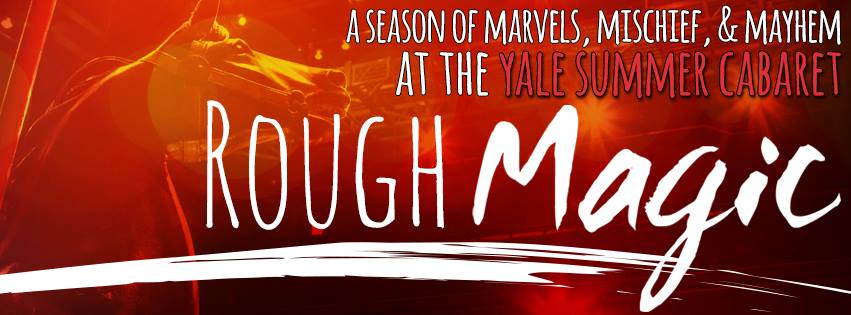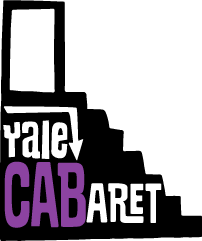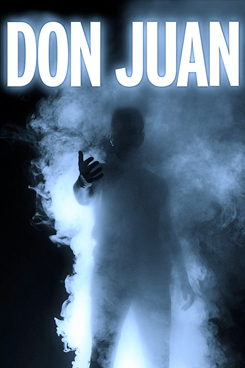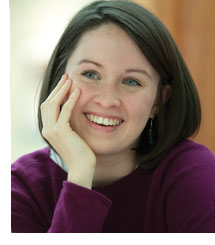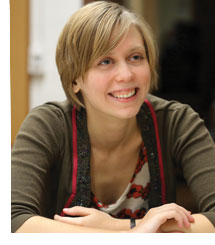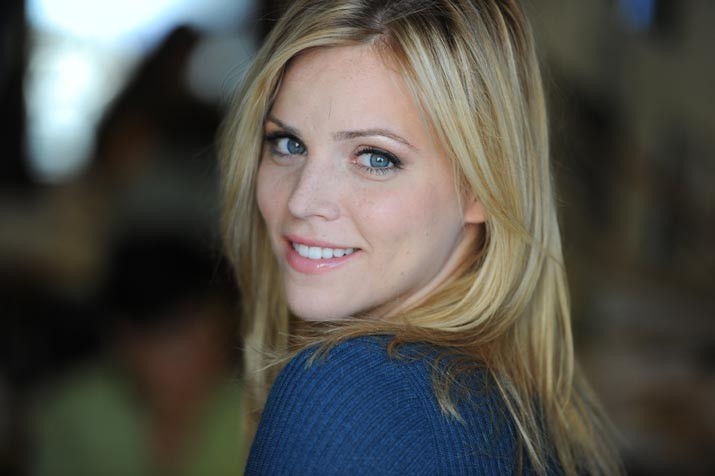Tickets on sale now for the Yale Summer Cabaret
At the close of Shakespeare’s The Tempest, Prospero, a magician and, to many, a stand-in for the playwright, says he will abjure his “rough magic”—right after he cleans up a few loose ends. The Yale Summer Cabaret, which opens June 4th, takes its title from the phrase Prospero uses to characterize what we might call his “process.” To artistic director Sara Holdren the phrase is suggestive of theater as a means to “reawaken wonder.” Her troupe at the Summer Cab this year, called “The Rough Magic Company,” have banded together “around ideas of enchantment,” of finding a way to do theater that keeps alive both parts of the phrase: “rough,” as in worked-out together, as when you “rough out” a design, but also “rough” as in not smoothed into the safe and predictable; “magic,” as that element of unpredictable mystery that makes live theater seem sometimes a feat by magicians.
Holdren, a director who will graduate from the Yale School of Drama this month, will run the Summer Cab with three other women: Associate Director Rachel Carpman, Managing Director Flo Low, and Associate Managing Director Emily Reeder. They will be working with a nine person acting company, mostly of other YSDers, selected from auditions, and two guest directors: Andrej Visky, a director graduating in May, and Leora Morris, a director finishing her second year of study in YSD.
The primary values for this year’s Cab are “joy, collaboration, generosity, invention, and play.” To Holdren, these words capture the method in the magic: the joy of working together, the generosity needed to collaborate effectively, and the invention and playfulness that allow for inspiration and surprise. The aim is to fine the kind of big, crazy productions able to defy the possibilities afforded by the basement space on Park Street that is the Cabaret. The mandate this year is to find new approaches, both with classic texts, such as Shakespeare and Marlowe, as well as original work never before seen. All productions will be created by the respective play’s director and the company.
One particularly inspiring event for Holdren in generating the kind of collaborative effort she has in mind was a visit in the spring to Yale by Dmitri Krymov, the innovative Russian director. As Holdren says, Krymov’s one week workshop, in which a performance of Three Sisters was generated by performers and designers, put on the table her own ideal of how theater should work. “It was a beautiful coincidence” that her own hopes for the Summer Cab season should be presented in such a timely fashion to her fellow YSDers. Krymov, who was been a visual artist as a well as a scenic designer, has developed methods to involve the entire company in rigorous collaboration, or what Holdren calls “an explosive playground” of invention and innovation, driven not by a given play per se, but by the company. As she says, she wished “everyone skeptical about devised theater could be in the room” during Krymov’s seminar. “Nothing was extraneous,” everything came into play in creating the piece.
Holdren’s ideal will get put into practice this summer with a dream group of designers, who worked with Holdren on her truly impressive thesis show, The Master and Margarita, last fall, and a cast of actors who, in audition, were asked to create pieces together rather than simply present monologues. The tech team consists of: Chris Thompson, Claire DeLiso, Set Design; Joey Moro, Lighting and Set Design; Andrew F. Griffin, Lighting Design; Haydee Zelideth, Costume Design; Kate Marvin, Sinan Refik Zafar, Sound Design; Rasean Davonte Johnson, Projection Design; Lee O'Reilly, Production Manager; Scott Keith, Technical Director; Victoria Whooper, Emily Zepeda, Stage Manager. The acting company features: Chalia La Tour, Melanie Field, Leland Fowler, Niall Powderly, Christopher Ross-Ewart, Elizabeth Stahlmann, Josephine Stewart, Shaunette Renée Wilson.
Such are the makings of the Rough Magic Company. Now for the summer’s offerings.
First up, from June 4 to June 18, is Midsummer, an adaptation, predominantly, of Shakespeare’s A Midsummer Night’s Dream. Holdren, who has directed at least six Shakespeare plays, beginning as an undergrad at Yale, says she has worked with “a whole lot of cut texts” but “never did a full-on adaptation.” Holdren and her co-adaptor Carpman are aiming at something closer to a devised piece, “riffing on” MND, but also working-in lines from other Shakespeare plays to create something entirely new and never before seen.
As Holdren describes it, the worlds of the play are perfect for Rough Magic’s aims: there is the “real world” of Athens, from which the lovers escape into the woods; there is the contrived world that the mechanicals—Bottom and the rest—try to invent via theater; then there is the magical world of the fairies, ruled by Oberon and Titania. Holdren says she chose Shakespeare’s popular and possibly too-often-produced play for the challenge of finding novelty in a play too easily dismissed as trivial. Rough Magic’s Midsummer is “a little darker” than the common view of MND, which, Holdren says, is “so wonderful but often so bad” in performance. Her hope is that the novelty of the Rough Magic approach will “bring in people with a love of Shakespeare as well as people who are skeptical” about the prospect of breathing new life into such a familiar play. The audience should “see something different” than they’ve seen before, and should be “surprised by the play again.” That would be a good example of the kind of re-enchantment Rough Magic has in mind.
The summer’s second play, running from July 9-July 18, is a piece wholly devised for Summer Cabaret by the company, conceived and directed by Leora Morris. Love holds a lamp in this little room, the title, is taken from a poem by the subject of the play: the actress/poet/painter/ Adah Isaacs Menken, a mercurial bohemian spirit of the mid to late 1800s.
Ostensibly raised Christian as a creole of a mixed race union in New Orleans, Menken married several times, and in one of her marriages became a convert to Judaism, her husband’s faith, and a student of the Kabbalah. Having, in other words, a rather fluid identity and a rather unique self-conception, she was most famous for riding a horse nude, or at least in a nude suit, on stage. She was also a lover of Mark Twain and a bit of a femme fatale who composed a suicide note to the public before her failed suicide attempt. Morris’ play is drawn from Menken’s life and work to investigate what Holdren calls “her multiplicity of self,” showing that what might be seen as the vagaries of her life was a means to avoid creative pigeonholes and to celebrity the otherness of identity. Today, Menken would likely be a performance artist. Think of the play as the kind of piece this intriguing and restless figure might write and appear in.
The theme of figures who risk damnation for their activities is always popular because inherently dramatic. It was present in Holdren’s thesis show The Master and Margarita, and it was present in Andrej Visky’s thesis show, Molière’s Don Juan. From July 23-August 1, the Summer Cab will present the granddaddy of all workings of the theme, Christopher Marlowe’s Doctor Faustus, directed by Visky.
What intrigues both Holdren and Visky in such tales is what Holdren calls “an affinity for stories that don’t fit” the usual expectations of theater. Such plays are the expansive and “uncontainable” odd ducks that stretch the boundaries of theater and the limits of the team’s talents. The attraction of Marlowe’s Faustus is that it concerns a hero who is “modernist avant le lettre.” Or at least that’s what will become clear in this new adaptation by Visky and dramaturg Kee-Yoon Nahm, that may create an interplay between Marlowe’s Faustus and Goethe’s Faust, and will use puppets for the more demonic aspects of the tale. One of the attractions of Faustus is the character of Mephistopheles, a “tormented trickster” who, as a necessary evil, draws upon and the furthers the very notion of a stage villain. Holdren calls the play a “rollicking romp” and the press release says audiences will experience “a world gone to hell. And a hand puppet.”
For the final play of the summer, Holdren, who directs, turns to a popular, fairly recent play by Yale School of Drama instructor Sara Ruhl: a theatrical adaptation of Virginia Woolf’s unorthodox novel Orlando, August 6-August 15. The story of a character who lives successively as a man and as a woman, and who exists from Elizabethan times to what was, when the novel was published, the present day of World War II, Orlando presents not only a consideration of what difference, if any, gender makes, but also a mini history of the fortunes of England.
Holdren claims a long-enduring interest in the possibilities of adapting novels for the stage. Her originary moment for the fascination was watching the 9 hour adaptation of Nicholas Nickleby on DVD as a child. Her dream adaptation would be Dickens’ Our Mutual Friend. Her amazingly successful presentation of the play derived from Bulgakov’s wildly unorthodox novel The Master and Margarita certainly attests to her commitment to the task. What interests her is the live aspect of storytelling, and the issue of how to involve the narrative voice in the theatrical presentation. Ruhl’s use of Woolf’s voice in Orlando Holdren finds exemplary, particularly when one realizes that there is no dialogue per se in Woolf’s novel. This means that Ruhl had unusual freedom in creating monologues for the characters as well as choric speeches to further the action. And Ruhl’s way with the text gives the director a like freedom to “break down the different roles at will.”
For Holdren, Orlando as the final play takes us back to the Elizabethan worlds of Shakespeare and Marlowe, while its gender-changing hero/ine complements the racial and artistic ambiguity of Adah Isaacs Menken. Holdren’s fellow directors—Leora Morris and Andrej Visky—share a “generous imaginative spirit” and are skilled at “soliciting ideas from the entire company” when working on a play. For Holdren, the Summer Cabaret this year is the perfect black box in which to engage in an artistic process that will yield company-based, collaborative theater, with plays that will shift genre and feature heroes that will shape-shift before our very eyes. All of which will further the “rough magic” of the Cabaret for its fans and followers and new-comers and discoverers alike.
For tickets and more information: summercabaret.org
